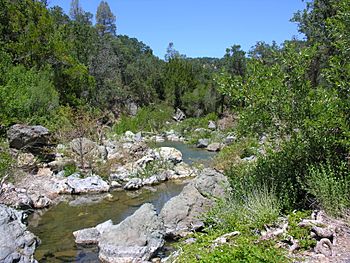Isabel Creek facts for kids
Quick facts for kids Isabel Creek |
|
|---|---|

Isabel Creek in July 2011
|
|
| Country | United States |
| State | California |
| Region | Santa Clara County |
| Physical characteristics | |
| Main source | Southwestern flank of Jays Ridge in the Diablo Range 2,637 ft (804 m) 37°15′40″N 121°31′39″W / 37.26111°N 121.52750°W |
| River mouth | Confluence with Smith Creek to form source of Arroyo Hondo 1,585 ft (483 m) 37°23′00″N 121°41′34″W / 37.38333°N 121.69278°W |
| Basin features | |
| Tributaries |
|
Isabel Creek is a stream about 18 miles (29 km) long. It flows year-round, starting near Mount Hamilton in Santa Clara County. The creek flows northwest along the eastern and northern sides of the mountain. It eventually meets Smith Creek. Together, they form Arroyo Hondo. Isabel Creek is part of the larger Alameda Creek water system.
History of the Name
The area around Mount Hamilton has a long history. In Spanish, the mountain was called "Sierra de Santa Isabel." The highest point was first known as Mount Isabel.
In 1861, two geologists, William Henry Brewer and Charles F. Hoffmann, climbed the mountain. They didn't know it already had a name. So, they named it Mount Hamilton. However, they did put "Isabel Valley" on their map, located east of the mountain.
Later, in 1895, the USGS found a peak nearby. This peak was about 14 feet (4.3 meters) taller than Mount Hamilton. They decided to name this taller peak Mount Isabel.
Where Isabel Creek Flows
Isabel Creek begins high up, at about 2,637 feet (804 meters) above sea level. It flows north through a place called Isabel Valley. Since the 1940s, some of its water has been held back in Isabel Reservoir.
After leaving Isabel Valley, the creek continues flowing northwest. It crosses Mount Hamilton Road. Then, it runs along the eastern and northern sides of Mount Hamilton. Finally, Isabel Creek joins Smith Creek. This meeting point is about 9.5 miles (15.3 km) northwest of Mount Hamilton.
When Isabel Creek and Smith Creek join, they form Arroyo Hondo. Arroyo Hondo then flows into Calaveras Creek at Calaveras Reservoir. Calaveras Creek leaves the reservoir and joins Alameda Creek. Eventually, Alameda Creek flows into San Francisco Bay.
Animals and Plants in the Creek
Isabel Creek is home to many different animals. Some fish, like Steelhead trout (Oncorhynchus mykiss), have lived here for a long time. Scientists like John Otterbein Snyder collected these fish in 1898.
However, a dam called Calaveras Dam was built. This dam stops fish from San Francisco Bay from swimming upstream into Isabel Creek.
Even with the dam, some native fish still live in Isabel Creek. These include rainbow trout, California roach (Hesperoleucus symmetricus), and Sacramento sucker (Catostomus occidentalis occidentalis). These fish are found both above and below natural waterfalls in the area.
Another fish, the Speckled dace (Rhinichthys osculus), was seen in Isabel Creek in 1898. But more recent studies have not found them. So, it's not clear if they still live in the creek today.
Two types of frogs also live in Isabel Creek and nearby waters. These are the Foothill yellow-legged frog (Rana boylei) and the California red-legged frog (Rana draytoni).

